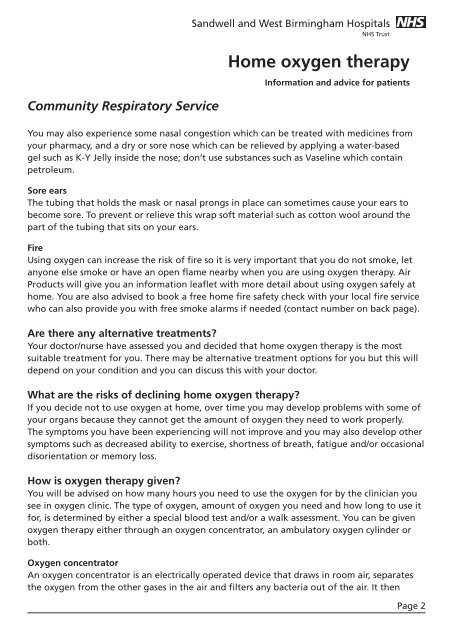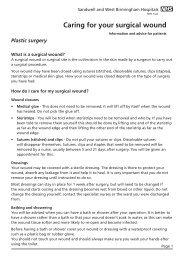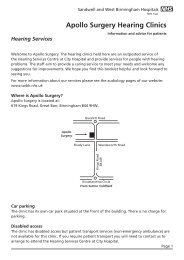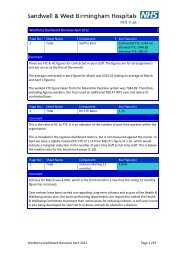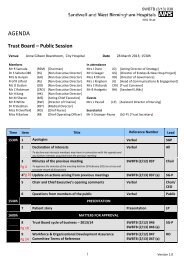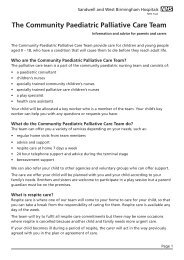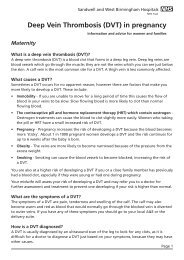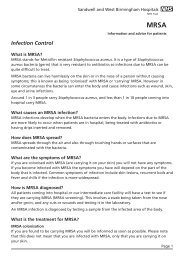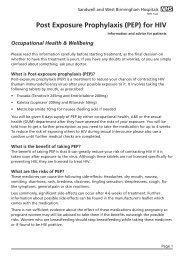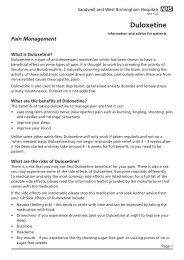Home oxygen therapy - Sandwell & West Birmingham Hospitals
Home oxygen therapy - Sandwell & West Birmingham Hospitals
Home oxygen therapy - Sandwell & West Birmingham Hospitals
Create successful ePaper yourself
Turn your PDF publications into a flip-book with our unique Google optimized e-Paper software.
<strong>Home</strong> <strong>oxygen</strong> <strong>therapy</strong><br />
Information and advice for patients<br />
Community Respiratory Service<br />
You may also experience some nasal congestion which can be treated with medicines from<br />
your pharmacy, and a dry or sore nose which can be relieved by applying a water-based<br />
gel such as K-Y Jelly inside the nose; don’t use substances such as Vaseline which contain<br />
petroleum.<br />
Sore ears<br />
The tubing that holds the mask or nasal prongs in place can sometimes cause your ears to<br />
become sore. To prevent or relieve this wrap soft material such as cotton wool around the<br />
part of the tubing that sits on your ears.<br />
Fire<br />
Using <strong>oxygen</strong> can increase the risk of fire so it is very important that you do not smoke, let<br />
anyone else smoke or have an open flame nearby when you are using <strong>oxygen</strong> <strong>therapy</strong>. Air<br />
Products will give you an information leaflet with more detail about using <strong>oxygen</strong> safely at<br />
home. You are also advised to book a free home fire safety check with your local fire service<br />
who can also provide you with free smoke alarms if needed (contact number on back page).<br />
Are there any alternative treatments?<br />
Your doctor/nurse have assessed you and decided that home <strong>oxygen</strong> <strong>therapy</strong> is the most<br />
suitable treatment for you. There may be alternative treatment options for you but this will<br />
depend on your condition and you can discuss this with your doctor.<br />
What are the risks of declining home <strong>oxygen</strong> <strong>therapy</strong>?<br />
If you decide not to use <strong>oxygen</strong> at home, over time you may develop problems with some of<br />
your organs because they cannot get the amount of <strong>oxygen</strong> they need to work properly.<br />
The symptoms you have been experiencing will not improve and you may also develop other<br />
symptoms such as decreased ability to exercise, shortness of breath, fatigue and/or occasional<br />
disorientation or memory loss.<br />
How is <strong>oxygen</strong> <strong>therapy</strong> given?<br />
You will be advised on how many hours you need to use the <strong>oxygen</strong> for by the clinician you<br />
see in <strong>oxygen</strong> clinic. The type of <strong>oxygen</strong>, amount of <strong>oxygen</strong> you need and how long to use it<br />
for, is determined by either a special blood test and/or a walk assessment. You can be given<br />
<strong>oxygen</strong> <strong>therapy</strong> either through an <strong>oxygen</strong> concentrator, an ambulatory <strong>oxygen</strong> cylinder or<br />
both.<br />
Oxygen concentrator<br />
An <strong>oxygen</strong> concentrator is an electrically operated device that draws in room air, separates<br />
the <strong>oxygen</strong> from the other gases in the air and filters any bacteria out of the air. It then<br />
Page 2


